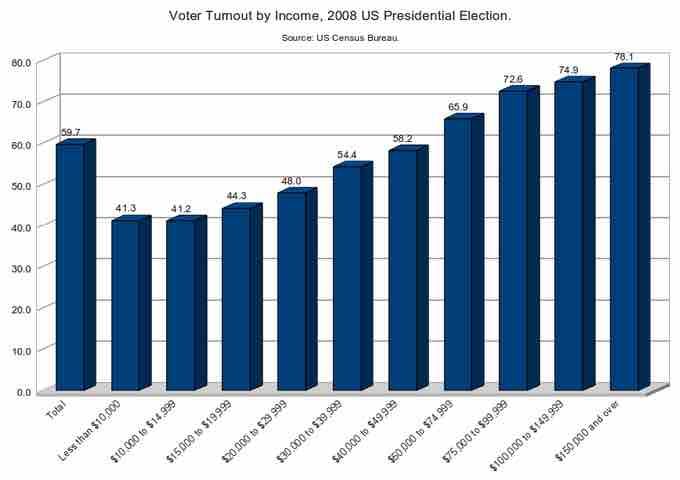Introduction
Socioeconomic status (SES) is determined by an individual's level of education, income, and occupation. Socioeconomic factors significantly affect whether or not individuals develop the habit of voting. Voters and political activists generally are more educated and better off financially than the general population. Because of this, these people have the best chance of having their views represented in government. Meanwhile, those who rely the most on government programs and policies, such as recipients of public assistance, often have fewer opportunities to participate and are less engaged with the process of electing representatives.
Income and Voting
Independently, income has some effect on whether or not people vote. Wealthier people are more likely to vote, regardless of their educational background . Wealthier and better educated people tend to vote more often, participate more in political activities, and donate more money to causes than poorer or less educated people. They also have greater access to the resources that facilitate political activity, including contact with people in powerful positions.

Voter Turnout by Income (2008)
This is a figure illustrating the different rates of voting in the 2008 U.S. Presidential Election by income. The higher income, the more likely a person is to vote.
Education and Voting
The most important socioeconomic factor affecting voter turnout is education . The more educated a person is, the more likely he or she is to vote. Studies show that this is true, even controlling for other factors that are closely associated with education level, such as income and class. Education has the strongest impact on participation, as it provides people with background knowledge as to how the political system works and how the action of voting is connected with the realities of their lives. Educated people develop the skills that allow them to follow and understand national and international events through the mass media. They are likely to form opinions about political issues and engage in discussions. The most popular political blogs, such as Daily Kos and Huffington Post, are produced and read by well-educated people. Education also prepares people to deal with the bureaucratic aspects of participation, such as registering to vote or organizing petition drives. Eighty-three percent of people with a graduate school education voted in the 2008 presidential election. In comparison, only 39% of those without a high school diploma voted that year. The 2010 midterm elections were decided primarily by people with at least some college experience. Less than 5% of voters had no high school education, 16% were high school graduates, 29% had some college education, and 50% were college graduates.

Voter Turnout by Educational Attainment –2008 Presidential Election
Educational attainment, an indicator of social class, can predict one's level of political participation. Those with high educational attainment are more likely to vote in elections than those with little education.
Occupation and Voting
People's occupations also are related to their participation and their likelihood to vote. People in managerial and professional positions are the most politically active, followed by craftspersons, service workers, and laborers. Many managers and professionals follow politics as part of their jobs. The unemployed are the least inclined to participate in politics through voting, however, because they may rely on governmental services to survive, they are frequently among those most immediately affected by the outcome of elections.